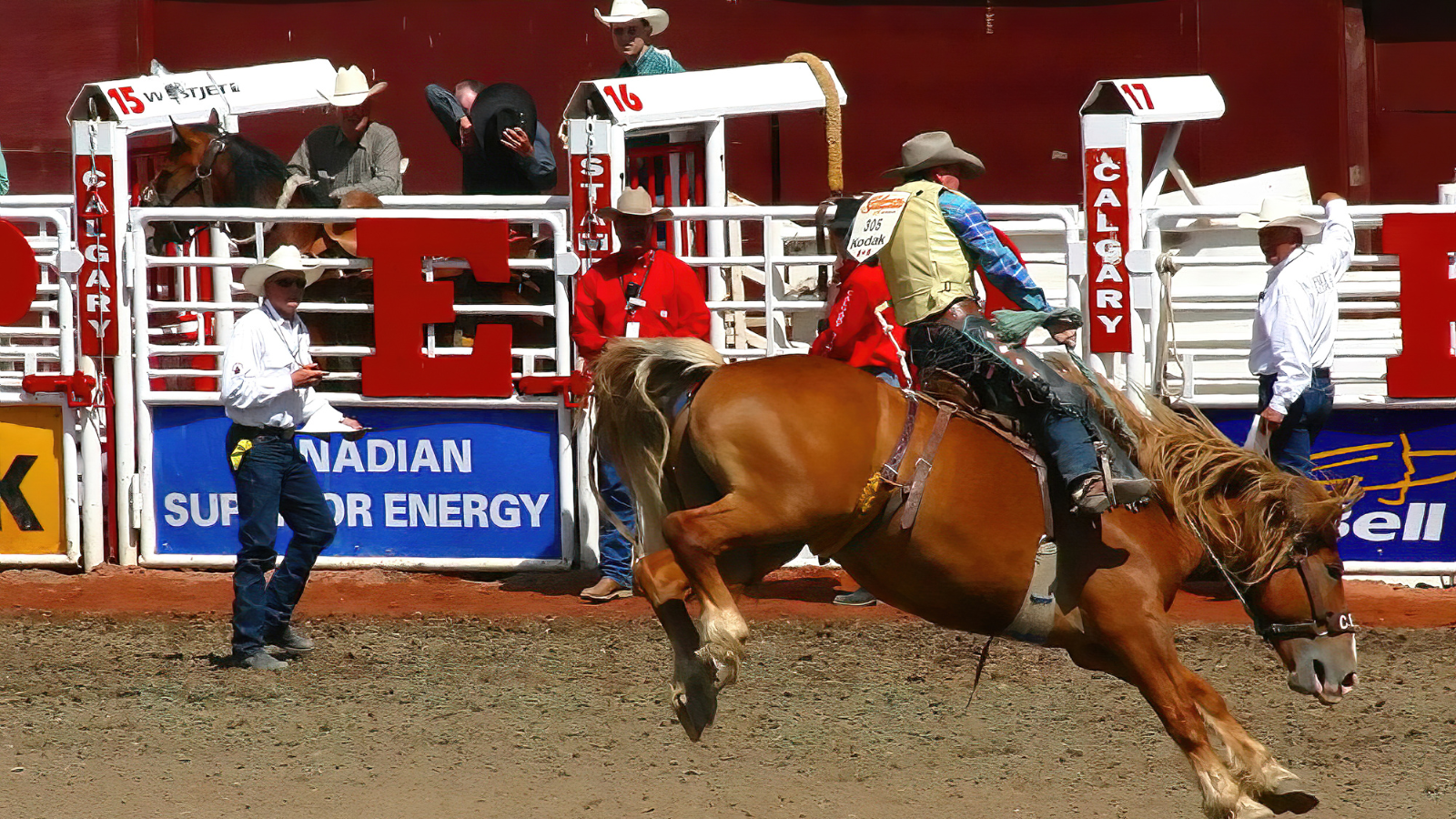 Summer is upon us. The ground is dusty. Heat permeates everything. Animals and humans alike are sweaty. Both nervous and excited. It’s time. Gates open like explosions, and the following eight seconds are a celebration of excellence. The synchronicity in the moment makes you wonder if the participants were bred for this moment. The answer is yes. It’s part of who they are.
Summer is upon us. The ground is dusty. Heat permeates everything. Animals and humans alike are sweaty. Both nervous and excited. It’s time. Gates open like explosions, and the following eight seconds are a celebration of excellence. The synchronicity in the moment makes you wonder if the participants were bred for this moment. The answer is yes. It’s part of who they are.
First out of the gates are the prized stock, having been bred for the task. Genetic science is a big part of the business. The featured animals are worth their weight, are very specialized, and are treated like the high-performance athletes they are. Desired behaviours are rewarded. Punishment is seldom used as it never results in the best long-term outcomes. It’s a practical approach as well as an expression of core values. Familiarization and nurturing keep minds calm and reward with the best results.
Second through the gate is the human competitor. They often come from roots deeply entrenched in the lifestyles of self-sufficiency, hard work, and traditions. They are rewarded only by results. They understand their reliance on partners and allies – mammal and human. Teamwork is their magic sauce that creeps into their DNA. They have been nurtured and encouraged. Punishment is only the disappointment of poor performance and bad outcomes.
It’s a lifestyle, blended with business. It’s consuming, and excellence takes time, effort, knowledge, and commitment. These folks understand risk and reward. They are, at a minimum, some of our finest entrepreneurs, and more often now are the leaders of enterprises with business complexities that rival the most complicated of any industry. Who are they? What do they believe? How do they succeed? And what can we learn from them?
The Principled Life of a Cowboy: Values and Determination
The cowboy has long stood as a symbol of the rugged, self-reliant spirit of the North American frontier. Far from just a romantic figure in Western folklore, the cowboy’s life is shaped by harsh realities, long hours, and tough choices. Living and working on the open range demands not only physical toughness but also a deeply principled approach to life. Values of hard work, honesty, respect, and loyalty form the moral foundation of the cowboy way. Passed through generations, they created this culture of character and quiet determination, continuing to influence rural and Western identity today. And if you’re wondering, the description applies in even greater measure to the women who have been there at every turn of North American western life.
Hard Work and Responsibility
At the core is an unshakable work ethic. Ranch and farm work is unrelenting and physically demanding, often beginning before dawn and ending well after dusk. Cowboys care for their livestock, mend fences, carefully identify and track their assets, honour their obligations, and endure despite extreme conditions. There are few shortcuts – only the steady rhythm of daily tasks and the expectation on each to carry their own weight. To shirk one’s responsibilities is to fail the team and ‘risk the herd’, which can have dire consequences. This life commitment is both a necessity and a point of pride. Value the satisfaction of a job well done, even if no one else noticed.
Honesty and Integrity
Honesty is a cornerstone. Life on a range, in the back quarter, or out in the barn requires trust, and trust can only be earned through consistent, honourable behaviour. Their word is their bond. Agreements have been traditionally sealed with a handshake, and a cowboy or cowgirl who lies, steals, or betrays a partner’s trust can find themselves quickly isolated. They govern themselves with codes of conduct that emphasize personal accountability. It works, not out of fear of punishment, but because maintaining one’s integrity is essential to survival and mutual respect.
Respect for Others and Nature
These folks work in teams, and success depends on cooperation and mutual respect. They learn to read each other’s moods, to anticipate needs without being asked, and to defer to experience without resentment. Whether young or old, green or seasoned, what matters is how one conducts oneself. Respect extends to the animals under their care. While the job sometimes requires tough decisions, most cowboys – and all of the good ones – take pride in the most humane treatment of livestock and their equine partners. A skilled competitor on a rodeo ground forms a bond with their horse, understanding that trust and communication, not brute force, produce the best results.
Equally important is their respect for the land. The range is a workplace and a teacher. They know the terrain intimately: they watch the weather, understand grazing patterns, and recognize signs of scarcity or disease. The knowledge is not just practical, it reflects their belief in stewardship. The land is not something to be conquered, but to be cared for. These specialists of the land and nurturers of animals develop a quiet reverence for the natural world, and this respect informs their choices and shapes their humility.
Loyalty and Brotherhood
Loyalty within the cowboy communities is a matter of necessity and character. On cattle drives, in fields or on isolated ranches, they rely on each other for safety and survival. Bonds form through shared labour, hardship and risk, creating strong confederations. They have their partner’s back in a storm, ride out as a posse to recover the lost or misplaced, or take the time to teach a younger hand the ropes. Extending beyond friendship, it’s an expectation of the life itself.
Perseverance and Grit
Few occupations demand more perseverance than those of the cowboy culture. Whether battling a blizzard, chasing strays across rough terrain, or nursing an injured horse back to health, they demonstrate grit in everything they do. There are few easy days, and seldom any sympathy. Yet, they do not complain. They endure, they adapt, and they try again. It is a defining trait of their identity – perseverance in the face of pain, isolation, or defeat. They believe in seeing a task through, not for the recognition but because it’s the right thing to do.
Legacy and Principle
Life in the cowboy culture, while rooted in specific historical and geographic contexts, has come to represent a larger ideal. Despite technology and impacts of change over time, core values endure in the hearts of those who still ride fences and live close to the land. Their legacy is not in boots, buckles or hats, but in their character. They live by a quiet code that values integrity over profit, work over words, and loyalty over convenience.
In this world that often shifts with trends and expedience, the principled life of the cowboy culture stands as a reminder that strength can be humble, and honour can be lived every day. Whether on horseback or foot, the true cowboy or cowgirl remains a timeless figure of grit, grace, and grounded values.
Find the Time
If you can, find time to visit a rodeo ground. Watch the excitement of people proud of their roots. You’ll be taken by the athleticism of the stock and the sportsmanship and drive of the competitors. You will be entertained.
Remember these lives – the stock and the competitors – are built on values, nurtured, passed down, embraced, and expressed in action. Know that the competitors and event organizers are community builders, entrepreneurs, informed risk takers, and astute individuals in the realm of business. They run respected organizations and deal honestly with others. They won’t tell you, but through their daily action they share, especially when there are no witnesses to impress. Their desire to help comes from within and not from the expectations of others.
And as you watch them, think of their values and their approach, and their commitment, and how their practices and determination can easily be initiated and embraced in your business, to help your organization become stronger and better.
Enjoy your summer and see you on the Grounds!
Russ Tynan
Principal







